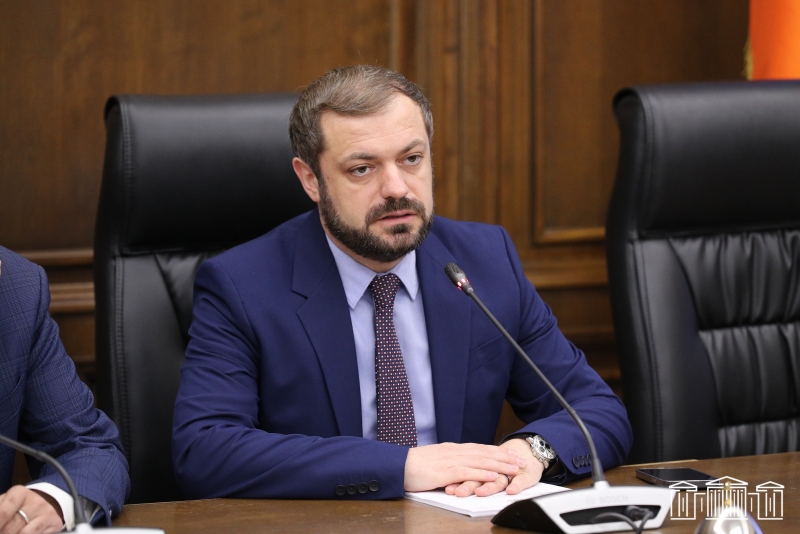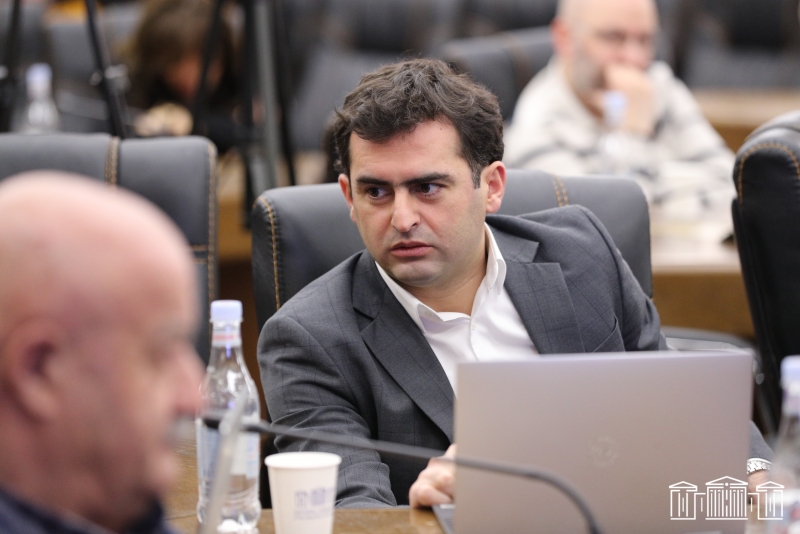The result of the Audit Chamber activity is to boost the public administration, and its objective is to form professional, unbiased and timely opinion on the public administration in two directions: legality of administration and efficiency.
On December 18, at the joint extraordinary sitting of the NA Standing Committees on Financial-Credit and Budgetary Affairs the Chairman of the RA Audit Chamber Atom Janjughazyan said, presenting for debate the current conclusion on Audit Results of Digitalization Process of Audit Chamber.
Touching upon the main theme, he documented that the formation of the Ministry of High-Tech Industry as an authorized body in boosting the coordination processes of digitalization and formation of the united digitalized atmosphere and digital economy, as well as the adoption of the RA digitalization strategy in 2021, created important preconditions in the advancement of the digital agenda in the Republic of Armenia.
According to Atom Janjughazyan, nevertheless, the audit results made by the Audit Chamber witness that there are essential gaps in the institutional capacities of the RA public sector, which have deterrent effect for the implementation of the digital agenda. In particular, the vulnerable environment of the cyber security contains risks of restricting the benefits of digitization, which requires to introduce the institutional structures of disclosing and protecting the critical information infrastructures.
Read also
According to the Chairman of the RA Audit Chamber, having problems with the limited capacities and strategic leadership, no measure designed by the digitization strategy has been fully carried out in the established terms. Moreover, in the conditions, where the profile digitization conceptual documents were elaborated by separate institutions, the strategy is not comprehensive, and as a consequence effective programme budgeting has not been provided in the sphere.
It was recorded that the Audit Chamber presented to the Ministry of High-Tech Industry more than two dozens of proposals for the solution of the recorded problems, aiming to promote the full realization of the potential of the state in the given sphere.
Presenting the audit results. He documented that the measures set by the strategy aimed at the formation of the cyber security institutional structures are not carried out, particularly, the Cyber Security National Centre was not created (term – December 2022), which, as it was envisaged should be the warrant for cyber security of the state systems, should ensure protection of personal data and boost the development of cyber literacy. The standards of the cyber security sphere are not localized and approved (Term – September 2021).
It was noted that in the inclusiveness growth of the digital environment of the citizens, economy and public administration, the institutional weak structures of cyber security or their absence creates essential risks in ensuring strategic objectives of the RA digital transformation.
The Audit Chamber presented 24 proposals for solving the recorded problems. Atom Janjughazyan enumerated several of them: To work out the plans of cyber continuity aimed ensuring the RA digital disruption, to localize and approve cyber security standards and other base requirements, to plan and carry out cyber exercises for assessing the capacities of acting complying with the plans preset in emergency situations or accidents, bringing forth the shortcomings and planning measures for their elimination.
He also informed that the Ministry of High-Tech Industry has not fulfilled any of them, though, according to the Chairman of the Audit Chamber, there is a certain progress.
The RA Minister of High-Tech Industry Robert Khachatryan thanked the attendees in his speech for effective cooperation and noted that though by the audit results it seems to be that almost nothing has been done in the digitalization process, but the digitalization is a continuous process.
“Almost all the remarks were accepted by us,” the Minister said and added: “Such measure, which is not in process, is not recorded by audit.”
According to him, as the technologies change all the time, the strategy continuously needs reviewing.
It was noted that there are subjective and objective reasons for everything. “We can record that we have big certainty how are we going to move, because changes have been made in the general digitalization approaches and methodology, and now an approach is adopted, which is called citizen-based, i.e. the digitalization process is observed by the citizen, the citizen should contact on one platform, from one place,” Robert Khachatryan said.
According to him, as a result of changes, there is a need to review the digitalization strategy to comply it with today’s reality.
The Minister considered important the proposal of having consolidated budget. It was mentioned that the Ministry of High-Tech Industry has an approved budget of 10 billion AMD for 2024, which will be directed to financing of the digitalized programmes presented by different institutions.
The Minister of High-Tech Industry Robert Khachatryan also answered the MPs’ various questions regarding the sphere.
The Chair of the NA Standing Committee on Financial-Credit and Budgetary Affairs Gevorg Papoyan was interested in the person, who is responsible for the shortcomings recorded in the audit of the Audit Chamber.
In response, Robert Khachatryan noted that the one, who is responsible for the measures stemming from the strategy is the Minister. However, according to him, there have been financial problems and conclusions have been made on them. It was also mentioned that in 2022, budgetary sums of money have not been designed for digitalization.
The question of the Chair of the NA Standing Committee on Economic Affairs Babken Tunyan referred to the cyber security, if the general digitalization does not stand before the problems without its introduction.
In response, it was noted that the cyber security and digitalization should be introduced and be in process in parallel. “It will be better that the cyber security will go on one step forward,” the Minister of High-Tech Industry said. According to him, in the near future, legislative initiatives regulating and establishing the sphere will be adopted.
The question of the Chair of the NA Standing Committee on Health Care Narek Zeynalyan related to the negative formulations of the audit of the Audit Chamber: Why the measures have not been carried out? Why haven’t these terms preserved, etc?
In response, Robert Khachatryan stated that there are measures, which are continuous. According to the Minister, works were done for implementation of the measures. He proposed the attendees to separately debate the raised issues.
The Chair of the NA Standing Committee on Defense and Security Andranik Kocharyan was interested in the work to be done by the Ministry of High-Tech Industry for solving the problems in 2024.
In response it was noted: “We have our viewpoint, our picture how the digitization can be done.”
The NA Vice President Hakob Arshakyan documented that there are numerous political issues in the universal digitalization problem, which are of no technical character. According to him, the aim of the Digitalisation Council is that the digitalisation programmes will be systemized in many departments. As he assured, the Ministry of High-Tech Industry, according to the law, is responsible for the implementation of the digitalization policy. It was mentioned that the role of the National Assembly is based on strategy and budgetary process.
“And the issues refer to the fact that this whole system will work based on strategy, if it works effectively or not. The conclusion of the Audit Chamber is that the implementation of these measures have not resulted in its effectively acting, the issues are mainly directed to it, and in terms of structures, I believe that there are numerous issues how the distribution of responsibilities is done in order the issues will also be during the budgetary debates,” Hakob Arshakyan said and added: “We do budgetary centralization, and the Ministry of High-Tech Industry controls all these programmes on its part.” It was also noted that there is a problem in order the strategic priorities are carried out and in the viewpoint of budgetary control we’ll have transparency and accountability.
The Deputy Governor of the RA Central Bank Armen Nurbekyan, the RA Deputy Minister of High-Tech Industry Gevorg Mantashyan, the Director of the Information Systems Agency of Armenia Nerses Yeritsyan also presented observations on the problems of the audit of the Audit Chamber.
Professional debates will be organized on certain issues in the near future.
National Assembly of the Republic of Armenia
































































